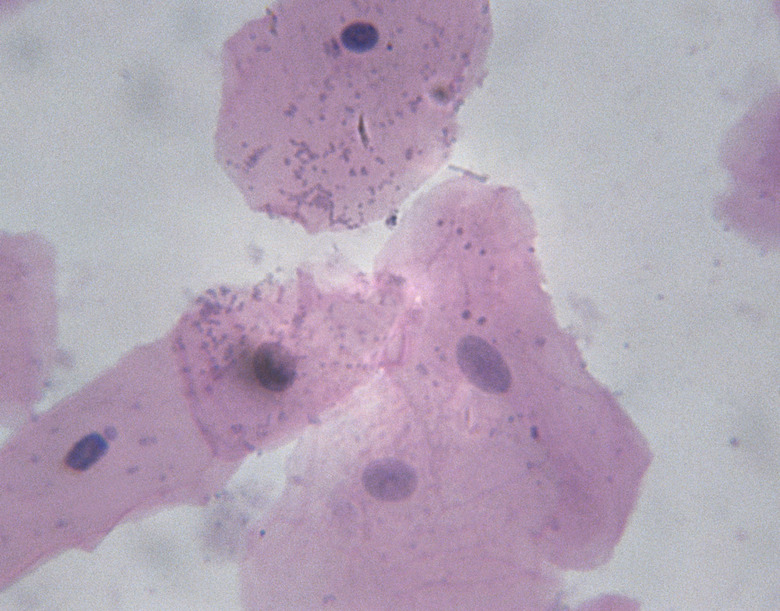What Molecules Can Pass Through The Plasma Membrane Without Any Assistance?
The contents of a cell are separated from its environment by a plasma membrane, which consists largely of two layers of phospholipids — or a phospholipid bilayer. The bilayer can be thought of as a sandwich that encircles the cell, with a nonpolar, water-fearing spread between pieces of bread. The "spread" is like oil, in that it does not mix with water, which is a polar substance. Therefore, things that like to dissolve in water — such as salts — cannot pass through the nonpolar "spread" of the cell membrane. However, molecules that have an oily nature, in that they are nonpolar, can, as long as they're not too big, freely pass through the cell membrane. These oily molecules include many things that are essential for living organisms, such as cholesterol, steroid hormones, and vitamin D.
Cholesterol
Cholesterol
Cholesterol is a mostly nonpolar molecule that contains four fused rings of carbon and hydrogen atoms. Cholesterol is produced by animals and is an important molecule for life. Cholesterol can pass through the cell membrane or it can stay in the cell membrane and become part of its structure. In the cell membrane, cholesterol is a crucial molecule that adds strength and flexibility to the membrane and prevents it from being too fluid.
Vitamin D
Vitamin D
Vitamin D is a fat-soluble vitamin, meaning it is nonpolar like the middle of the cell membrane. The production of vitamin D first starts in the skin, when sunlight hits cholesterol and initiates a reaction that modifies it. However, vitamin D also is present in the food that we eat or can be ingested in pill form. As the food or pill is digested and travels into the small intestine, the vitamin D is freed and can be absorbed by the cells that line the small intestine. Vitamin D can pass freely through the membrane of these cells.
Sex Hormones
Sex Hormones
Steroid sex hormones are biochemically modified cholesterol molecules and cause a person to develop male or female characteristics. Androgens are the group of sex hormones that contribute to male characteristics, such as enhanced muscle growth, facial hair and sperm production. Estrogens are the group of sex hormones that cause female characteristics, such as breast development and a woman's monthly period. Steroid sex hormones cross the cell membrane and activate proteins inside of the cell that then turn on specific genes.
Stress Hormones
Stress Hormones
During times of stress the adrenal glands that sit on top of the kidneys produce a stress hormone called cortisol. Like steroid sex hormones, cortisol is also a steroid hormone that is made from cholesterol. The adrenal glands have two main layers, an inner and an outer layer. Cortisol is produced by the outer layer, called the adrenal cortex. Since it is a steroid hormone, and belongs to a group of hormones called glucocorticoids, it can freely pass through the cell membrane. During times of stress, cortisol causes cells to release sugar into the blood stream and preserves energy by stopping or slowing certain bodily functions that are not important for fighting or fleeing. These include appetite, digestion and reproductive functions.
Cite This Article
MLA
Ph.D., David H. Nguyen,. "What Molecules Can Pass Through The Plasma Membrane Without Any Assistance?" sciencing.com, https://www.sciencing.com/molecules-can-pass-through-plasma-membrane-assistance-21672/. 13 March 2018.
APA
Ph.D., David H. Nguyen,. (2018, March 13). What Molecules Can Pass Through The Plasma Membrane Without Any Assistance?. sciencing.com. Retrieved from https://www.sciencing.com/molecules-can-pass-through-plasma-membrane-assistance-21672/
Chicago
Ph.D., David H. Nguyen,. What Molecules Can Pass Through The Plasma Membrane Without Any Assistance? last modified March 24, 2022. https://www.sciencing.com/molecules-can-pass-through-plasma-membrane-assistance-21672/
